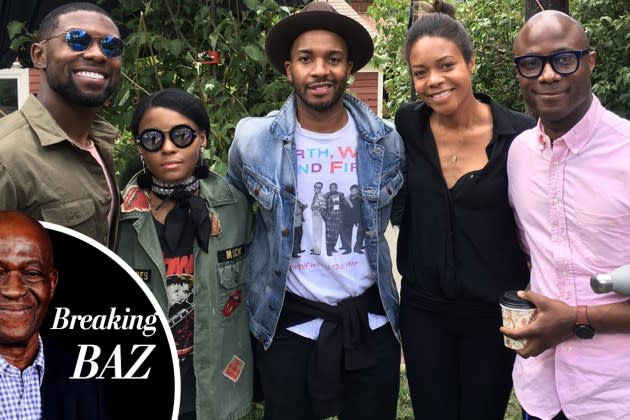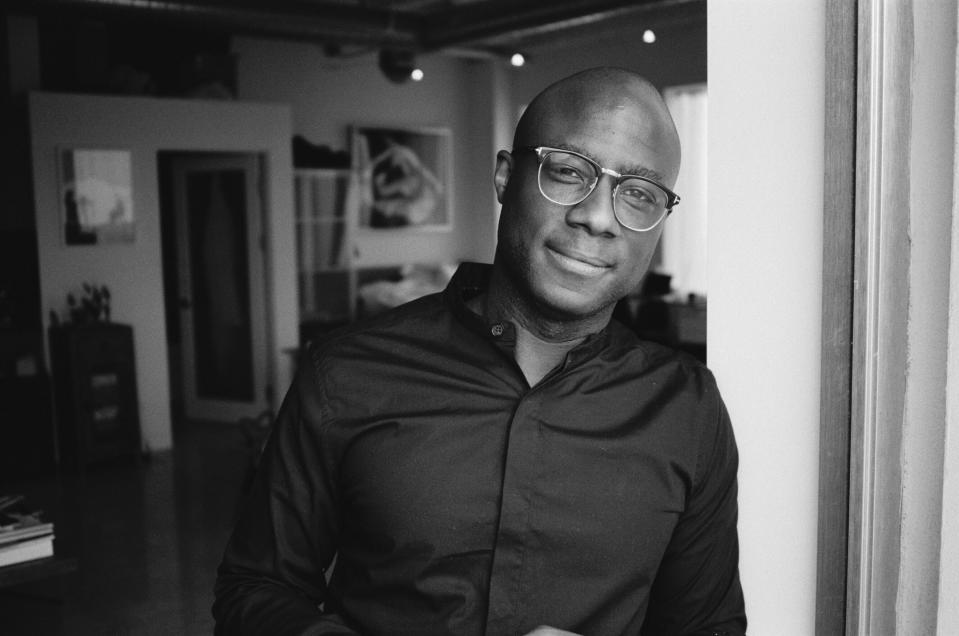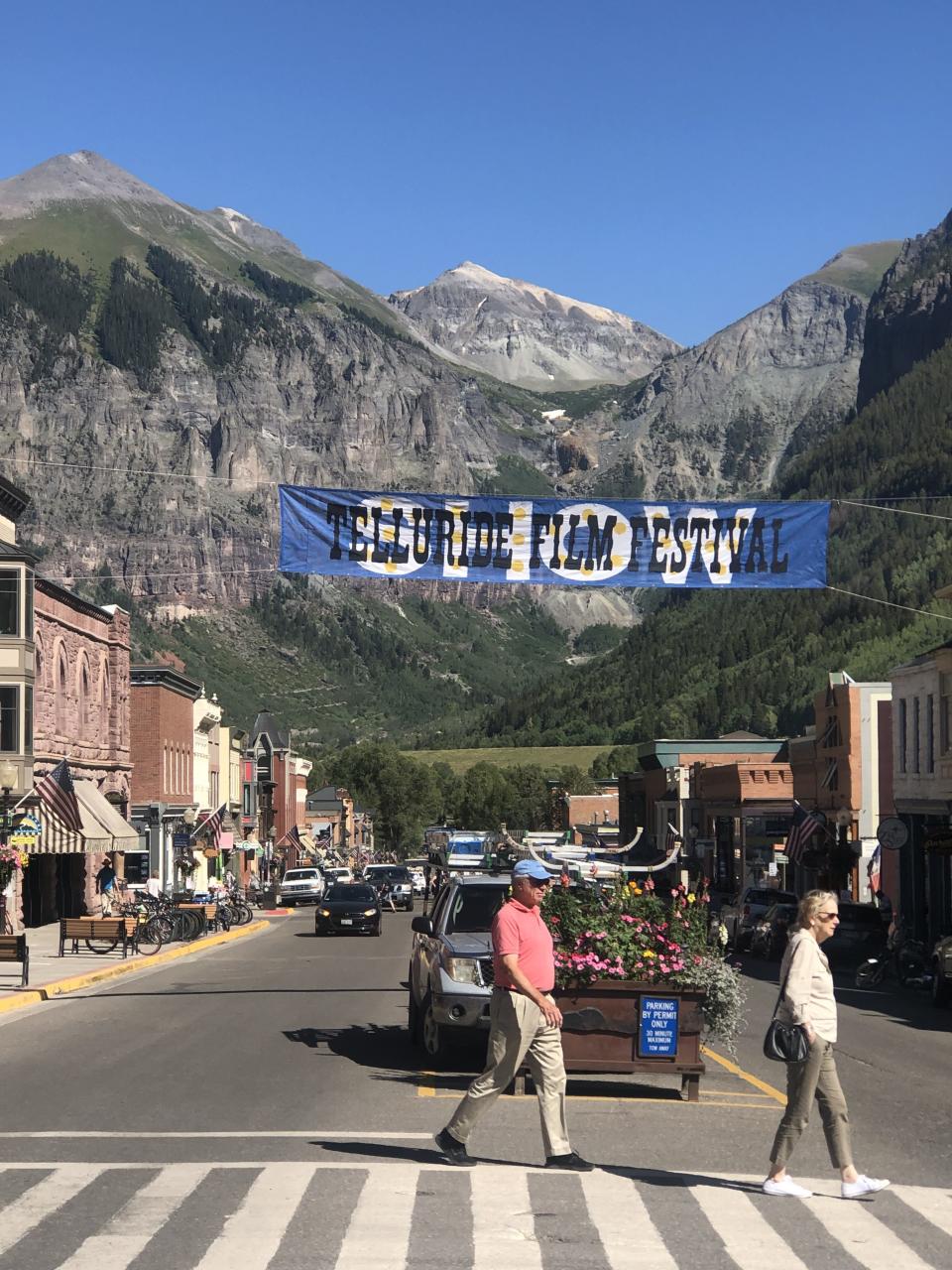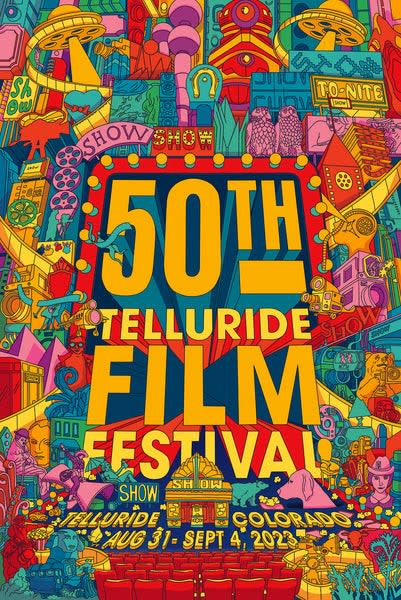Breaking Baz at Telluride: ‘Moonlight’ Oscar Winner Barry Jenkins Celebrates 50 Years Of The Festival & How He Started Out As A Telluride Dog!
- Oops!Something went wrong.Please try again later.
- Oops!Something went wrong.Please try again later.

EXCLUSIVE: The Telluride Film Festival, held in an old mining town high up in a picturesque alpine valley in the Rockies, marks its 50th anniversary this week, and Oscar-winning Moonlight filmmaker Barry Jenkins undoubtedly is one of its favorite sons.
He’ll be making the trek to the mountains as he did for the first time in 2002 as a student from Florida State film school. The festival has a student symposium where novice filmmakers can meet and engage with professionals over the Labor Day weekend.
More from Deadline
“There is no red carpet, there are no frills,” the director told me. “If you see a filmmaker in line for a cup of coffee, speak to them. They actually want to be engaged. That’s why filmmakers come over and over again, year after year.”
Jenkins obviously wasn’t around Telluride in the ’70s, but he acknowledges that he has heard that “socioeconomically, it was a bit different than it is now. It was still probably a very difficult place to get to, but there was a democratization of life once you got there.”
That vibe continues, he said.
The festival tries to strip away barriers, he told me, even though audiences pay hundreds of dollars for passes.
However, he noted that the short films are free for one and all to see.
Jenkins has curated the short film section for the past decade, a task he continues to this day.

He’ll be taking a few days away from working on the live-action/animation film Mufasa: The Lion King to attend this year’s festival that kicks off Thursday for a four-day run rather than its usual three days.
Jenkins told me that he admires the festival for enabling free access to the shorts and for its generosity to emerging artists. “And it’s crazy,” he said. “I’m saying this of the town in the middle of nowhere. It’s very difficult to get to and very expensive these days.”
But it’s welcoming.
“It’s why I — a kid from the projects of Miami, Florida — showed up at this place, the whitest place I ever been in my life. Whitest, wealthiest place I’ve ever been to in my life, and I didn’t feel any of that. I didn’t.”
That first time, Jenkins remembers attending Q&A sessions with Fernando Meirelles, whose City of God was shown. Chris Hedges and D.A. Pennebaker. Lynne Ramsay screened Morvern Callar, and David Cronenberg showed Spider.
“Really cool to be in that kind of environment and have that kind of access,” he said.
Over the past two decades, his experience has been that “people engage with you, and it’s a place where you can meet them on the level of just being human beings. And then the art is secondary.”
Indeed, my own first encounter here was with Brad Pitt.
He was right in front of me on Colorado Avenue, the town’s Main Street.

I was deliberately not engaging with him because I didn’t want — this was a first — to appear to be too pushy.
“Don’t you want to say, ‘Hi, we have met, we do know each other?” Pitt asked warmly.
What me? Hell yeah. We had a nice chat about films. Not his private life.
This rarely, if ever, happens at the likes of Cannes, Venice, London or Toronto. You do bump into people at such places, but there’s a wall between you and them. The wall consists of agents, producers, studio people and publicists.
Brad Pitt that day in 2012 was on his own.
Once I arrived back at my hotel, and Francis Ford Coppola was sitting in the lounge having a nightcap.
“Join us,” he said.
And shopping with Meryl Streep when she needed walking boots was a comic highlight,especially with Leslee Dart and Peggy Siegal in tow.
Jenkins remembers walking down the street and tapping Cronenberg on the shoulder. “I was like, ‘Hey, I really dug your film [Spider]. It was really beautiful.’ He goes, ‘Oh, cool, thank you very much.’”
“I go, ‘Can I ask you a question?’ He goes, ‘Yeah.’”
Jenkins grimaced as he recalled the conversation.
“I was a kid. This was the worst question I could ever ask. I said, ‘People were talking about your film, and there are people who were describing it as pretentious. And I hate that because sometimes we’ll be trying to do interesting things in film school, we get called pretentious.’”
Jenkins said Cronenberg responded: “Well, you have to unpack what the word ‘pretension’ means. Am I trying to do certain things? Yes, I am. Do I ever want to feel bad about that? No.”
Then Cronenberg told Jenkins that it was a really good question and “went about drinking his coffee. But that’s the kind of thing you did that happens at this festival. I’m at a different place now. I don’t know that it still happens, but those were the kind of things that were happening there, and that’s what made me fall in love with it.”
One memory holds dear. Ramsay’s Morvern Callar played “and a fire alarm went off and nobody moved because it felt like it was part of the scene. All these red lights were flashing in the theater, and I thought, ‘Oh ,this is immersive cinema.’”
He remembers Gus Van Sant’s movie Elephant, inspired in part by the 1999 Columbine High School mass shooting in near Denver. “This is a movie about one of the most heinous and media-covered mass shootings in the history of this country. It took place in Colorado maybe eight years prior to the film.
“And I walk out of the theater, which is inside a middle school gym, and there are just teenagers on the lawn just bawling their eyes out. I mean, it was just like one of the most intense things I’ve ever experienced.”
Jenkins has not missed a single year since 2002.
Initially, though, he had no idea how he was going to do it.
Jim Bedford, one-time director of operations at the festival, gave a talk to the symposium kids and told them, “If you enjoy your experience at the festival, why don’t you come back next summer?”
Jenkins was like, ‘Oh yeah, I definitely want to do that.’ And so I came back the next year as what they call a production apprentice for the festival.”
He gave a hearty laugh and explained that apprentices were called “the Telluride Dogs.”
“You just do all the grunt work leading up to the festival, and that was how I came back the second time, which led to just different various production jobs just because I wanted to be there every summer. And that’s really what got the ball rolling.”
The festival has now become ”a part of my life,” he told me.
The first Telluride Film Festival was held in late August 1974, and movies were screened at the Sheridan Opera House.
The co-founders were Bill and Stella Pence, pioneers of repertory cinema through Janus Films; Tom Luddy movie producer and ardent film archivist; and James Card, also a film preservationist and first curator of the department of film at the George Eastman House of Photography.
Card died in 2000. Bill Pence’s death was announced late last December, and Luddy passed away in February.
Gloria Swanson, Francis Ford Coppola and Leni Riefenstahl were the festival’s inaugural honorees.
Apparently all hell broke loose.
Jewish organizations objected to Riefenstahl’s associations with Adolf Hitler and demanded that Swanson and Coppola withdraw. Both declined to do so.
At the time Bill Pence and fellow festival administrators noted that the awards were being given to artists “who have made exemplary contributions to the art of the film.”
They also screened Riefenstahl’s 1934 documentary The Triumph of the Will , a study of the 1934 Nazi Nuremberg rally.
I knew Luddy, and several years ago my wife and I spent time with him in Berkeley, where he lived. We had long conversations about his love for cinema, and he mentioned the Riefenstahl affair.
He pointed out that Riefenstahl had been at the first Telluride because of her filmmaking. They weren’t concerned about whether she had been friendly with Hitler. “We were concerned about what she did as an artist, as a filmmaker,” he told me in 2017.
Their ethos was to show films that mattered — show films by directors and artists who mattered, and damn the red-carpet hoopla.

Over the years the festival has acquired a reputation as a launching pad for awards-season pictures.
Jenkins himself introduced Steve McQueen’s 12 Years a Slave at Telluride, which led to him meeting those behind it and, eventually, to his film Moonlight being backed by Plan B Entertainment ,the production company led by Dede Gardner, Jeremy Kleiner and Pitt.
However, Julie Huntsinger, the festival’s director since 2007, has zero patience for chatter about Telluride and Oscars.
As you can imagine, Huntsinger has been too busy to talk to me for this piece, but in the past her response to me about being part of awards season was to mutter something about “horseshit.”
Yet, it’s a fact that studios push to get their films included in Telluride’s program, but I happen to know for a fact that many so-called awards contenders are rejected by Huntsinger and her team.
Yes, Moonlight was shown at the festival, but that was a heck of a long time before it was considered an awards-season movie.
Luddy told me at the time that they loved the movie and wanted to show it. Simple as that.
One rule that has endured over the decades is that the films are not announced until the start of the festival.
“They wanted to be clear that the main point of the festival is to show movies,” Jenkins explained.
“They drill that shit into you. I know you critics and awards people, you have all this information, but as a member of the show — which is what we call the festival — you stay zipped.”
I wondered what language the festival uses to enforce the secrecy of the lineup.
“Yes, it’s ‘Shut the f*ck up.’
“Yeah, that is it. Especially when it’s your own piece in the festival! Yeah, shut the f*ck up.”
Stella and Bill Pence, Luddy and Card, and now Huntsinger, have been able to keep the show on the road for half a century.
“Fifty years is a long time,” Jenkins said. “It’s hard to maintain the energy of anything for that long a duration.
“I think the festival itself is like this iceberg,” with the director at the top.
He noted how Luddy would mention that he, the Pences and Huntsinger would be “at the top of this thing. But holy cow, there’s this two-week window where the four of us become 500 people.”
Jenkins added, “And I think all that energy beneath the surface of the iceberg — that’s part of preserving the energy of the show as well.
“And here I am, I’ve been there 20 years. I’m working on this movie right now. I probably should not be taking these days off to be at 10,000 feet drinking wine and watching movies. But I can’t help myself.”
Where does he place Telluride?
“That’s a terrible question,” he snorted.
“Yeah, I don’t rank festivals. Telluride’s very special to me in a very particular way. Toronto was also special to me in a very particular way. Every film I’ve every made including The Underground Railroad, if you consider that a film, has in some way screened at the Toronto Film Festival.
“So that one and Telluride have very special places in my heart.”
He smiled, looked straight at me. ”Look, I love film festivals.”
Then he conceded that “this one, of course, has my heart.”
Mine too.
Best of Deadline
Venice Film Festival 2023 Photos: Luca Guadagnino, ‘Comandante’ Opening Film & Damien Chazelle
Venice Film Festival @ 80: Memorable Moments & Stars 1932-2023 - Photo Gallery
2023 Premiere Dates For New & Returning Series On Broadcast, Cable & Streaming
Sign up for Deadline's Newsletter. For the latest news, follow us on Facebook, Twitter, and Instagram.

